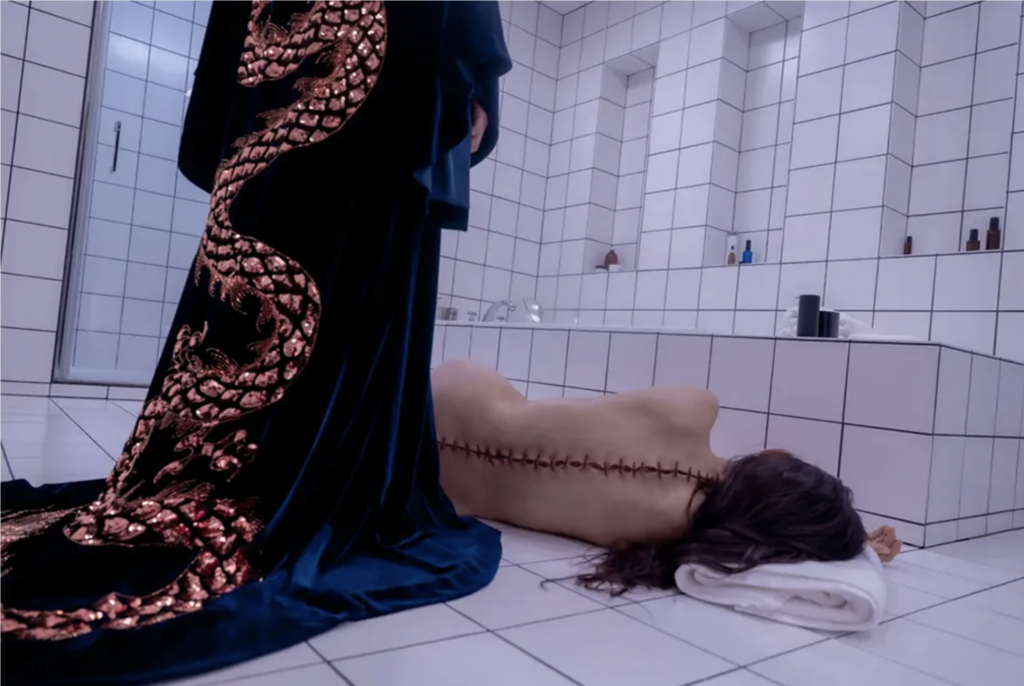When Carolie Fargeat’s The Substance premiered at this year’s Festival de Cannes, the response was electric. It seemed immediately that the festival had another Titane — Julia Ducournau’s controversial body-horror oddball, which snagged the Palme d’Or three years ago — on its hands. Reports rolled in of screaming audience members, award predictions abounded and IndieWire called it an “instant classic.”
With promises of shock, awe and disgust, I trekked to the IMAX theater at the off-festival-grounds Cineum and waited an hour and a half just to score a front-row seat. With the screen towered over me and the sound rattling my seat, I knew immediately I was in for an ultra-sensory experience.
And that, it certainly was. Only a few minutes into the film, its disturbing anatomical close-ups and mushy sound effects already had me squirming in my seat. When one character — a tyrannical TV exec played hilariously by Dennis Quaid — gluttonously slurped down a plate full of shrimp, I nearly expected his gooey saliva to land right in my lap (splash zone!). Fueled by expertly-executed special effects, The Substance only continued to up the ante with its horror and grotesqueness, leaving no corner of its premise unexplored.
The film follows Elisabeth Sparkle, a washed-up actress played by Demi Moore with a once-popular workout show whose ratings vary inversely with her age. Threatened with being replaced, Sparkle is tipped off by a mysterious young doctor who tells her about a secret new miracle drug, “The Substance,” which will preserve her youth and make her a better version of herself.


The film slingshots into its action extremely quickly, offering little insight into Sparkle’s preceding life or career apart from a birds-eye time lapse of her fading walk-of-fame star. Fargeat seems entirely uninterested in exploring the lore of its titular drug, or offering believable justification for Sparkle to start injecting herself with some back-alley green goo. All this would be forgiveable if done in the high-camp style of Death Becomes Her (a film that The Substance seems to draw inspiration from quite liberally), but The Substance’s quickness feels motivated more by laziness than comedic value. The world is simply shoddily-constructed and devoid of detail, lending a disappointing hollowness to the rest of the film’s events.
When it comes to its social commentary, The Substance jumps the gun once again: It’s hard growing old, even more so as a woman, and God help you if you’re a woman in Hollywood. Beauty standards and self-hatred offer a solid thematic foundation, but one that the film plays out in its first act, and eventually buries as its plot gets increasingly absurd.
This absurdity, however, is where The Substance ultimately redeems itself. Without spoiling too much of the film’s deliciously repulsive mechanics, Sparkle generates a second self — wide-eyed poster girl Sue, played by Margaret Qualley — with whom she begins a fiery tug-of-war of consciousness. Both actresses serve as killer foils for each other, but Moore shines especially in her commitment to Sparkle’s monstrous downward spiral.
In its last act, the film truly goes for broke in a way that throws commentary to the wayside and aims to shock and entertain. This proves a wiser decision than reiterating its messaging, as it doesn’t really have all that much to say to begin with. During its blood-soaked finale, I couldn’t help but cackle with delight at the way Fargeat really let the shit hit the fan.
With up-and-coming streamer MUBI having acquired The Substance for U.S. distribution, and in light of its (perplexing) Best Screenplay win at Cannes, it will be interesting to see how American critics and audiences react. Its themes are palatable, low-hanging and Hollywood loves a self-reflective piece. It’s sure to produce its fair share of social media fodder. Yet elevated horror has yet to receive its dues from establishments like The Academy, and The Substance could easily become a victim of generic prejudice.
While The Substance may not be as groundbreaking as hyperbolic early reports (I’m looking at you, IndieWire) made it sound, it’s a movie that’s hard to hate. As a feminist text, it reads more like a picture book than a manifesto. But who doesn’t love a picture book? — especially one whose ridiculous, gruesome visuals are so sure to stick in your mind as these.

